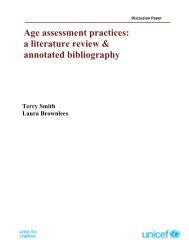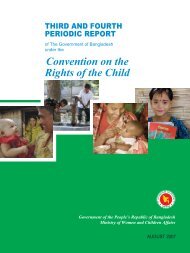Government-funded programmes and services for vulnerable - Unicef
Government-funded programmes and services for vulnerable - Unicef
Government-funded programmes and services for vulnerable - Unicef
Create successful ePaper yourself
Turn your PDF publications into a flip-book with our unique Google optimized e-Paper software.
CHAPTER 9<br />
Department of Energy<br />
Introduction<br />
Neither the international, regional nor national child rights instruments expressly guarantees<br />
the right to electricity. All of them do, however, guarantee everyone the right to a healthy<br />
environment that promotes <strong>and</strong> is not harmful to one’s health or well-being. 97 It is arguable<br />
that this right includes the right of access to free electricity, especially when read in<br />
conjunction with the obligation imposed on the South African state by the Constitution to<br />
take ‘legislative <strong>and</strong> other measures designed to protect or advance persons, or categories of<br />
persons, disadvantaged by unfair discrimination’ (section 9(2)). Based on this provision, the<br />
Centre <strong>for</strong> Applied Legal Studies argues that there should not only be no differential adverse<br />
impact on poor consumers, but that ‘positive measures [should] be taken to reduce the cost<br />
of electricity to those consumers’ (CALS, cited in Malzbender 2005).<br />
Key policies <strong>and</strong> legislation<br />
● Constitution of the Republic of South Africa, Act No. 108 of 1996<br />
● Department of Minerals <strong>and</strong> Energy, Electricity Basic Services Support Tariff (Free<br />
Basic Electricity) Policy <strong>for</strong> the Republic of South Africa, 2003<br />
Programmes <strong>and</strong> <strong>services</strong> provided<br />
Free basic electricity<br />
Table 9.1 Programme/service map: Department of Energy<br />
Programme/<br />
<strong>services</strong><br />
Description of the<br />
<strong>programmes</strong>/actual<br />
service provided<br />
Targeted beneficiaries/<br />
qualifying criteria/how to<br />
obtain the service<br />
Delivery mechanism/<br />
service providers<br />
Free basic<br />
electricity i<br />
All households that are<br />
connected through the<br />
national electrification<br />
programme (that are on<br />
the grid) receive free<br />
basic electricity of 50<br />
kWh per household per<br />
month.<br />
Off-grid electricity<br />
users, that is,<br />
households using<br />
solar home systems<br />
installed through the<br />
National Electrification<br />
Programme, are<br />
Targeted beneficiaries<br />
Households living in<br />
poverty<br />
However, because of the<br />
difficulty of identifying<br />
households living in<br />
poverty, free basic<br />
electricity is provided<br />
to all households<br />
that are on the grid<br />
or off-grid <strong>and</strong> using<br />
solar home systems<br />
installed through the<br />
National Electrification<br />
Programme<br />
Local municipalities<br />
➔<br />
97 Section 24(a), South African Constitution, UNCRC, Article 24(2)(c); ACRWC, Article 14(2)(h)<br />
193
















